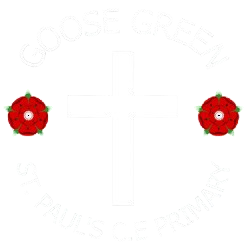English - Reading
At St. Paul’s, we believe that the exposure of children’s literature within the primary school setting is vital as a rich context for learning; not only within English as a subject but to support building a reading culture throughout the school. We aim to use high quality texts as a means of developing the spoken language requirements through debate, drama and discussion using the issues raised through, and within, the text.
By placing books at the core of our English curriculum, we are allowing teachers to use the text as the context for the requirements of the national curriculum. We believe that a context for learning is vital – and this is where our chosen approach can support teachers with ensuring that objectives for reading and writing, including those for grammar can have purpose. We will always aim for our writing opportunities to be meaningful, whether short or long and that the audience is clear. Books offer this opportunity: our final aim would be that children have real reasons to write, whether to explain, persuade, inform or instruct and that where possible, this can be embedded within text or linked to a curriculum area. Writing in role using a range of genres is key to our approach as is writing a critique of the text and making comparisons. Our expectations for writing ensure that by the end of their primary education, all pupils can write clearly, accurately and coherently, adapting their language and style in and for a range of contexts, purposes and audiences.
Our Reading Schemes:
In EYFS and Key Stage 1, we send home the Read Write Inc. decodable books which are closely matched to the children's phonic ability. Every week, each child will receive a Read Write Inc reading book, an extra Book-Bag book, and will have access to Read Write Inc. on-line.
In Key Stage 2, all children will receive a Rising Stars reading book and will have access to Rising Stars online (the online platform allows children to complete language comprehension activities).
- Immersing the pupils in quality texts in all aspects of the curriculum – including English, History/Geography, Science, Art, D&T, RE and music.
- Teaching Reading in discrete sessions using the VIPERS approach. This is an acronym for the six domains of Reading – this involves a focus on Vocabulary, Inference, Prediction, Explanation, Retrieval, Summary.
- Focus on developing pupil vocabulary by promoting
- Whole class reading is the method used to teach individual children to become equipped and ready to answer a variety of comprehension questions. Children are explicitly taught the skills of reading (outlined in the National Curriculum and the KS1 and KS2 test domains).
Key Stage 1
In Key Stage One children reading skills are taught and practised using the VIPERS during whole class reading sessions.
|
KS1 Content Domain Reference |
VIPER |
|
1a draw on knowledge of vocabulary to understand texts |
Vocabulary |
|
1b identify/ explain key aspects of fiction and non-fiction, such as characters, events, titles and information. |
Retrieve |
|
1c identify and explain the sequences of events in texts |
Sequence |
|
1d make inferences from the text |
Infer |
|
1e predict what might happen on the basis of what has been read so far |
Predict |
Key Stage 2
In Key Stage Two children reading skills are taught and practised using VIPERS during whole class reading sessions.
|
KS2 Content Domain Reference |
VIPER |
|
2a Give/explain the meaning of words in context |
Vocabulary |
|
2b retrieve and record information/ identify key details from fiction and non/fiction |
Retrieve |
|
2c summarise main ideas from more than one paragraph |
Summarise |
|
2d make inferences from the text/ explain and justify inferences with evidence from the text |
Infer |
|
2e predict what might happen from details stated or implied |
Predict |
|
2f identify/explain how information/ narrative content is related and contributes to meaning as a whole |
Explain |
|
2g identify/explain how meaning is enhanced through choice of words and phrases |
Explain |
|
2h make comparisons within a text |
Explain |

